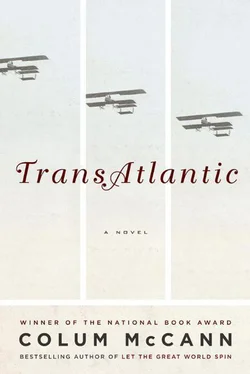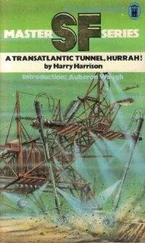Lottie stood at the edge of the tennis court, the camera dangling down by her side. She reached for the other part of the net and tautened it, bent down to pick a tennis racquet off the ground.
— Your daughter, said Brown. Her name escapes me.
— Lottie.
— Ah, yes.
— If you can give her a few moments for a photograph later, we’d be very grateful.
— And who is the young man?
— Our driver. He works at the RAF in London. He drove all night to pick us up in Southampton. Then brought us here.
— We will have to invite him to lunch then.
The china rattled in Brown’s fingers as he put the cup and saucer back down on the table.
— Is he a pilot?
— He wanted to be. He works in communications. Why?
— One goes up in a plane knowing, sometimes, that not all of you is going to come down.
The saucer dropped noisily on the glass table, and he put his hand into his pocket. Even through the cloth, his fingers were trembling. He stood and made his way through the room.
— You will forgive me? said Brown, and he went towards the door. He paused a moment, his back still turned. I have something I must attend to.
HE CAME DOWNSTAIRS fifteen minutes later. His tie was firm against his throat once more, and his cheeks were flushed. He came straight towards Lottie and shook her hand.
— Pleasure to see you, young lady.
— And you, sir. If you don’t mind? There’s good light.
— Ah, yes.
Lottie jiggled the camera from her shoulder. She guided Brown out to the verandah, asked him to sit on the low stone wall, in front of the rosebushes, overlooking the sea. He placed his walking stick along the top of the wall, squinted a little at the camera, took out a handkerchief, wetted it, shone the top of his shoe.
The sky behind him was a spectacle of raincloud, gray shot through with blue. A white rosebush drooped over his shoulder.
— So, Mr. Brown. A question.
— Ah, a quiz.
— Do you remember the color of the carpet in the Cochrane Hotel?
— The carpet? he said.
— On the stairs.
Brown shaded his eyes against the light. For a moment the gesture reminded Emily of that she had seen back in Newfoundland a decade ago.
— Red, he ventured.
— And in the dining room?
— Is that correct, red?
Lottie changed her angle, caught more of the shadow on the side of his face, moved fluidly along the wall.
— And the name of the road you drove along? To get to Lester’s Field?
— I see. A photographer’s trick. The Harbour Road, if I’m not mistaken. Do they still have those fishing boats?
— People still talk about you there, Mr. Brown.
— Teddy.
— They talk of you fondly.
Emily watched her daughter load another roll of film. The exposed roll went into the pocket of her dress. Over the years she had become sharp and skillful: she could reload in seconds.
— I have a shot of you shaving, she said. Do you recall the basin at the end of the field?
— We heated it with a bunsen burner.
— You were leaning forward into the basin.
— Just in case we were to fly in the evening.
As she spoke she dragged a chair across the verandah. Without asking, she guided Brown into the chair. He moved without complaint. The cloudshapes behind him shifted.
— You made our sandwiches, he said. That morning.
He smiled broadly. She changed her lens, hunkered down close to the ground, shot wide.
— I’m terribly sorry about your letter.
— Mother told me.
— I was awfully neglectful.
— It got across, Mr. Brown.
— Indeed, it did.
She lined up another angle, moved him slightly in the chair.
— It was green, by the way.
— Excuse me?
— The carpet, it was green. In the Cochrane.
He threw his head back and laughed.
— I could have sworn it was red.
Moments later a tennis ball shot high in the air and landed in the rosebushes behind Brown.
— Careful, he called out to Buster.
Brown walked across the verandah, and clambered on top of the low wall. He used his walking stick to poke the white ball from among the roses. It took several attempts. A small leaf clung to the edge of the ball.
Brown stepped down off the wall, arched his back, and flung the ball through the sky with surprising agility. She shot him midthrow, the leaf in flight behind him.
— Got it, said Lottie.
IN THE EARLY afternoon they took lunch on the verandah: Brown, Emily, Lottie, Ambrose, Kathleen, and Buster. An array of sandwiches with the crusts carefully cut. A dark fruitcake. A teapot kept warm under an embroidered cozy.
Emily was not surprised to detect a faint roll of whiskey coming from Brown. So that was why he had left the room. That was the ease he had felt with the photographs. But why not? He deserved a novelty of sensation, she thought.
She saw him lean close to Ambrose and touch the young man on the arm.
— And how are things beyond? asked Brown. In London?
— Perfectly fine, sir, said Ambrose.
— That’s quite an assignment. To drive these pretty ladies.
— Yes, sir.
— You’re Irish?
— Northern Ireland, sir.
— Jolly good. I like the Irish.
Ambrose faltered a moment, said nothing. Brown sat back in the chair, nodded, gazed off into the distance. His jacket flap fell open. She saw the peep of a silver flask. Kathleen placed her hand on Brown’s forearm to lock him there, to keep him to the ground, as if he might, in alcohol, take off. He nodded to her as if to say, Yes, dear, but just this one time, allow me that.
The afternoon light lapped around the verandah. At the end of lunch Buster bounded off towards the tennis court. He came back holding three racquets and a white tennis ball.
— Play tennis with me, please, please, please.
Lottie and Ambrose glanced at each other, stood up from the table, took the boy’s hand, strode across the lawn together.
— Ah, said Brown.
Emily watched from her garden chair. The net had been fixed and tightened. Her daughter bounced the tennis ball up and down on the racquet strings several times, then knocked it across the net towards Ambrose. A fine spray of moisture rose from the ball in the sunlight.
BROWN WAS SLEEPING by the time they left. Curled in a lawn chair with a blanket up at his neck. A caterpillar worked its way, green, across the stonework. Brown’s eyelids flickered. Emily reached out and touched his hand, cupped her palm around the edge of his fingers. His body shivered and it looked as though he might waken, but then he turned sideways in his chair and blew air through his lips, exhausted.
Emily stepped away from his chair. She would not mention the alcohol in her article, she knew. No need. No point. She would want, instead, to recall him in the air, between layers of cloud. To give him back that ancient dignity. To hear a whoop as he flew out over the treetops.
She tucked the flap of the blanket around his chin. His shallow breath on her fingers. Small hairs that he had neglected to shave. She turned and shook Kathleen’s hand.
— Thank you for your hospitality.
— You’re most welcome.
— Your husband is a fine man.
— He’s tired, that’s all, said Kathleen.
Ambrose cranked the car and put it in gear. He eased forward. They curved down the road, under the chestnut trees. It would, he said, be a long drive to London.
Emily glanced back and saw Kathleen and Buster standing on the steps of the house. Kathleen had her arms wrapped around her son, her chin perched on his head. The gravel crunched under the wheels.
The trees bent down to the road. The twigs jostled. A small wind shivered the leaves. Buster broke away and Kathleen turned, then disappeared into her house.
Читать дальше












